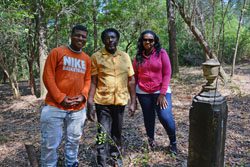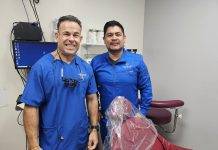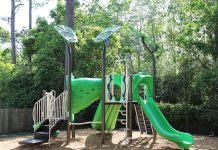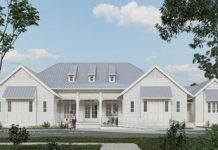Por Kimberly Blair, Gulf Power Company CANTONMENT, Fla.—Con su hija y su nieto a su lado, Walter McQueen de Cantonment se emocionó cuando caminaban por un sendero recientemente despejado llevándolo a un lugar recién abierto en el bosque y vieron las lápidas de los residentes de Muscogee que estan alli desde finales del 1800. El hombre de 68 años de edad, había estado tratando, desde que era un adolescente, en encontrar la sección afroamericana del viejo cementerio de Muscogee, que había desaparecido detrás de las ramas, arbustos y árboles y tragado por décadas de restos de hojas. En mayo, los empleados de Gulf Power Environmental Affairs y Plant Smith con el personal del Northwest Florida Water Management District para comenzar la limpieza de la vegetación para proporcionar acceso de las familias. McQueen no pudo encontrar las tumbas de sus propios miembros de la familia. Se cree que los sitios en un área que todavía tiene que ser hallado. Pero es, sin embargo, agradecido de poder estar en una parte del sitio histórico que fue una vez una parte de una próspera ciudad de madera que ya no existe. El nieto de McQueen, Kaleb Gulley, 19, que se acaba de graduar de la escuela secundaria, ha tenido una fascinación por la ciudad de su abuelo que siempre le habló y se emocionó cuando leyó una noticia acerca de los esfuerzos de limpieza. “Cuando yo estaba viajando en el autobús escolar, yo ví directamente aquí y pensé, wow hay un cementerio allí’,” dijo Gulley. “Hay tanta historia en Muscogee, y me gusta escuchar acerca de los aserraderos y correos y a las personas que solían vivir aquí.” Rebeca McQueen-Morris, de 32 años, dijo que solía ser una iglesia de santidad afroamericana a través del camino de tierra del cementerio. “Los miembros fueron enterrados aquí en la sección segregada,” dijo. Para estar seguro, el sitio es un recordatorio de los días de la segregación. También proporciona una foto instantanea de la gente que apoya la industria de la madera, que se sirve en el ejército y, como McQueen-Morris señaló, había adquirido algunos medios financieros basados en algunos de los monumentos ornamentados y lápidas de mármol que dejaron atrás. “Hay una gran cantidad de veces que tratar de investigar y aprender cosas acerca de nuestros antepasados, pero no tenemos los recursos, o algo así como que esto ocurra para ayudarnos a encontrar nuestra historia,” dijo. “Una vez que nos damos cuenta de nuestra historia, de dónde venimos, nos damos cuenta quienes somos.” FOTOS: # 1: Kaleb Gulley, su abuelo Walter McQueen y su tía Rebeca McQueen-Morris, hicieron frente a temperaturas de 90 grados para visitar por primera vez el viejo cementerio de Muscogee, un lugar que no era accesible por décadas. # 2: La familia McQueen intenta leer el nombre en una de las lápidas que fue descubierto cuando los empleados del Gulf Power se ofrecieron para ayudar a despejar la vegetación que envolvía el sitio. # 3: Rebeca McQueen-Morris ayuda a su padre, Walter McQueen, a buscar las lápidas para el nombre de sus parientes, su abuelo Elias McQueen y el tío Jim McQueen.![web_mcqueen_family_looks_at_grave[1]](https://latinomediainc.com/wp-content/uploads/2016/08/web_mcqueen_family_looks_at_grave1.jpg) “Esto es increíble para mí porque te digo mi abuelo Elias McQueen está aquí,” dijo McQueen. “Mi abuela me dijo que murió en 1946, un año antes de que yo naciera. Y tengo un tío, Jim McQueen, aquí que murió de polio a los 16 años de edad.”
“Esto es increíble para mí porque te digo mi abuelo Elias McQueen está aquí,” dijo McQueen. “Mi abuela me dijo que murió en 1946, un año antes de que yo naciera. Y tengo un tío, Jim McQueen, aquí que murió de polio a los 16 años de edad.”
By Kimberly Blair, Gulf Power Company The 68-year-old had been trying, since he was a teenager, to find the black section of the Old Muscogee cemetery, which had disappeared behind vines, brush and trees and swallowed up by leaf debris decades ago. In May, Gulf Power Environmental Affairs and Plant Smith employees teamed up with the Northwest Florida Water Management District staff to begin clearing the vegetation to provide families access. “This is amazing to me because I tell you my granddad Elias McQueen is here,” McQueen said. “My grandmother told me he died in 1946, a year before I was born. And I have an uncle, Jim McQueen, here who died of polio at 16 years old.” McQueen couldn’t find his own family members’ gravesites. He believes the sites in an area that has yet to be cleared. But he is nevertheless grateful to be able to stand in a portion of the historic site that was once a part of a thriving timber town that no longer exists. McQueen’s grandson, Kaleb Gulley, 19, who just graduated from high school, has had a fascination about the town his grandfather always told him about and was thrilled when he read a news story about the cleanup effort. “When I was riding on the school bus, I’d look directly out here and think, ‘Wow there’s a cemetery there,’” Gulley said. “There is so much history in Muscogee, and I like to hear about the lumber mills and post office and the people who used to live here.” To be sure, the site is a reminder of the days of segregation. It also provides a snapshot of the people who supported the timber industry, served in the military and, as McQueen-Morris pointed out, had acquired some financial means based on some of the ornate monuments and marble headstones they left behind. “A lot of times we try to research and learn things about our ancestors but we don’t have the resources, or something like this to occur to help us find out about our history,” she said. “Once we find out about our history, where we come from, we find out who we are.” PHOTOS: #1: Kaleb Gulley, his grandfather Walter McQueen and aunt Rebekah McQueen-Morris, braved 90-degree temperatures to visit for the first time the Old Muscogee Cemetery, a place that was not accessible for decades. #2: The McQueen family tries to read the name on one of the gravestones that was discovered when Gulf Power employees volunteered to help clear away vegetation that shrouded the site. #3: Rebekah McQueen-Morris helps her father, Walter McQueen, search the gravestones for the name of their relatives, his grandfather Elias McQueen and Uncle Jim McQueen. CANTONMENT, Fla. —With his daughter and grandson at his side, Walter McQueen of Cantonment became emotional when they walked down a newly cleared trail leading him to a freshly opened patch in the woods and saw the headstones of Muscogee residents dating back to the late 1800s.
CANTONMENT, Fla. —With his daughter and grandson at his side, Walter McQueen of Cantonment became emotional when they walked down a newly cleared trail leading him to a freshly opened patch in the woods and saw the headstones of Muscogee residents dating back to the late 1800s.![web_mcqueen_family_inspects_stone[1]](https://latinomediainc.com/wp-content/uploads/2016/08/web_mcqueen_family_inspects_stone1-216x300.jpg) Rebekah McQueen-Morris, 32, said there used to be an African-American Holiness church across the dirt road from the cemetery. “The members were buried here in the segregated section,” she said.
Rebekah McQueen-Morris, 32, said there used to be an African-American Holiness church across the dirt road from the cemetery. “The members were buried here in the segregated section,” she said.

















